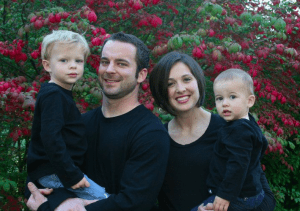The Gift of Sabbaticals
Josh Ross is the Lead Minister at the Sycamore View Church in Memphis, TN. He is the author of Scarred Faith and co-author of Bringing Heaven to Earth. You can connect with him on Twitter at: @joshualouisross.
My sabbatical came at a time when I needed a break. The grind of life and ministry had slowly taken its toll on me, and I felt some unhealthy emotions spreading, an unhealthy rhythm developing, and I was neglecting the very things (like spiritual disciplines) that keep me connected to the heart of God.
So, for six weeks, beginning the final week of October, I received a sabbatical. It was six weeks to step away from ministry and responsibilities, and to recharge, rest, and reenergize. At the Sycamore View Church, at the end of seven years of ministry, our elders give each full-time minister a six-week sabbatical. It is a gift. I completed seven years last summer, so it was time for my break.
Prior to my sabbatical, I wasn’t in a valley, but I was on the edge.
I wasn’t in a depression, but I was struggling more than ever to live from a place of joy and hope.
My heart was not full of anger and bitterness, but I had allowed unhealthy emotions to become lodged in there, and the cancerous effect was slowly spreading.
I was in a transition—our church was in a transition; Memphis was in a transition—and transitions can strengthen you because you are grounded in the heart and mission of God, or they can slowly turn you into someone you never wanted to become.
As for me, I needed focused rest. And it wasn’t until I was in it, that I realized how much I needed it.
Ministry, leading a church, and attempting to be a voice for God in a city can slowly begin to take a toll on you without you even knowing. Unfortunately, the very things that keep us healthy and rooted in the heart of God are sometimes the first things to be neglected or dismissed as we navigate our way through stress and transitions.
And sometimes the people who step on stage week after week are those battling the greatest demons that have the power to cause destruction. The enemy of God knows this, if he can begin to rob leaders (or any Christ-follower) of joy and hope, he can slowly weaken their witness to the world. When joy and hope wane, bitterness and resentment step into their place.
Focused, intentional rest doesn’t come easy, because we have become addicted to productivity. Our inability to faithfully rest is due to a number of things, yet at the top of the list is an unhealthy drive to perform, control, and produce. The affects are that we can slowly begin to forget that God can keep things going without us.
One can argue that Jesus’ sinlessness was rooted in His willingness to get away from the regular grind of life in order to rest with His Father. In Luke 4 Jesus went into a desert, in Luke 5 we are told that Jesus would often withdraw from crowds to be with God, and in Luke 6 we see Jesus spending a night alone with God before major decisions had to be made about appointed apostles and His ministry. Intentional rest was vital to the rhythm of Jesus’ life, and it should be for us as well.
Here are a few reasons why ministers need sabbaticals, and why elders should implement sabbatical policies for their full-time pastors.
Why ministers need sabbaticals:
- We live in what is arguably the most distracted and exhausted culture that has ever walked the face of the earth. We are more distracted than ever, and we are rest-deprived. The challenge for Jesus-followers is this; how is God going to speak a clear word into a distracted, exhausted heart? As there is no such thing as a doctor performing surgery on moving patients, so it is difficult for God to have His way with a heart that will never be still. A sabbatical forces us to unplug, disconnect, and center our hearts in God.
- Though we fail and fear to admit it, ministry can often lead us to trust in our degrees, experiences, and church-visions more than God’s provision and activity in our lives. Too often we live to prove how valuable, indispensible, and needed we are. The beauty of Sabbath, especially in the Old Testament, is that God wanted people to know that if they take their hands off of life, He would keep things going. The inability to take our hands off of life greatly hinders our willingness to trust in God.
- In order to be readjusted, refocused, and realigned, we need a season of rest. A lengthy season of focused rest brings to the surface all of our insecurities, fears, anxious thoughts, and demons that hide in the corners of our hearts. They are the very things that often haunt us. A season of rest can be painful as the brokenness and pain of our lives surface, yet we must enter into a sabbatical knowing that God ultimately has our best interests in mind. Any form of pain that surfaces is because God desires to lead us to a healthier place.
- The church deserves a pastor who ministers from a healthy, joyful place. They don’t need someone who ministers from exhaustion, clutter, and chaos. Sabbaticals aren’t for the minister alone; it’s for the entire church and/or organization.
Why elders need to implement sabbaticals for full-time ministers:
- If we are investing in long-term visions of spiritual growth, maturity, and Kingdom impact in our churches and surrounding communities, we must invest in short-term rest. In Wayne Cordeiro’s book Leading on Empty, he talks about how important it is for runners to drink water every fifteen minutes. It’s the short-term commitment that prepares us for the long-term vision. Help your pastors pace themselves.
- If it’s not enforced, it may not happen. As we hold employees accountable to have a good work ethic and to not abuse vacation time, we also need to hold them accountable to rest appropriately. A few years ago, our Executive Minister and I had to sit down with two of our ministers who were long due for their sabbaticals. We placed a 12-month calendar in front of them, and we gave them a few weeks to get back to us with six weeks blocked off for their sabbatical. They were told to not show up at work or at the office, or we would call the police. Of course we wouldn’t have called the police, but we wanted them to know that we needed them to rest, and to rest well.
- If the leaders of a church don’t model appropriate, healthy rest, how can we encourage members in our churches to do the same?
- It is vital for elders to differentiate between a sabbatical and a study break. They are not the same thing. Study breaks are important, yet they are hard work. Sabbaticals are for rest and being carefully tended to by God.
- Now, the push back from some people is that why should ministers get a sabbatical when they don’t. It’s a valid question, though it’s often asked in ignorance. Most people have weekends off, pastors don’t. That adds up over a year. Most people have holidays to travel and see family. Pastors don’t. Sundays, and weekly ministries, keep coming every week. I’m not arguing that pastors work harder and longer than other professions (it would be ridiculous to even try and compare), yet we must acknowledge that ministry is a grind. The church needs to be equipped to see how sabbaticals are a gift to a pastor and the pastor’s family, and how the church reaps the benefits.
Keep the conversation going. What does this look like in your church and organization? Why is rest important to the heart of God? Why is focused-rest so difficult for us, especially for ministers?
*The final chapter of Wayne Cordeiro’s Leading on Empty focuses on sabbaticals. It is a great resource for anyone in leadership.











